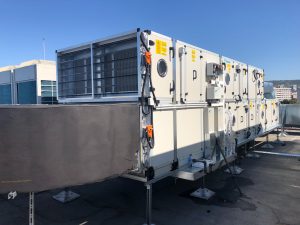Tags:
Industry news
We have been living with the COVID-19 situation since February. We have seen it evolving and impacting our lives to the point that we all have been required to adopt responsible behaviors, which include social distancing and wearing masks.
The lockdown imposed by governments across the world have helped controlling the spread of Coronavirus. And also the summer season has helped, since it has allowed people to spend more time outside, where distancing is easier, and where the virus is naturally “diluted” in an almost infinite quantity of air – which brings its concentration down to almost zero.

All this has led to prefer places that are not crowded, and particularly outdoor spaces, especially now that we are entering the summer season. This is because outdoor spaces, with a lower density of people, are the places that present the lower risk of contagion. In fact, if the virus were to be present outdoors, its concentration would be negligible for the reasons mentioned above.
However, with the change of season, we have been put into a situation where we need to deal with the possibility of contagion in indoor environments.
This means we need to understand how to live and perform all our usual activities in indoor environments safely, both at work – at the offices – and in our private lives – shops, shopping centers, gyms, restaurants, cinemas.
Mechanical ventilation as a solution against Coronavirus
We have been dealing with Coronavirus for a while now, and that has made us more knowledgeable. Of course, there is still a lot to do to win the battle against COVID-19, but in the last few months we have learned the hard way how to minimize the risks of infection, especially in indoor environments, were masks, proper air exchange and filtration have had a key role in preventing the curve of contagion from going up in an uncontrolled way.
We have been talking for a while about how in indoor environments the dilution process that naturally happens outdoors, must be ensured by proper ventilation.
But what do we mean by proper ventilation? We basically mean introducing a certain amount of fresh and filtered air into the building while extracting exhausted air.

This process can be guaranteed through mechanical ventilation systems, then ensuring the above-mentioned dilution process in indoor environments as well.
Both the air conditioning sector and scientific studies have been promoting the importance of ventilation systems able to provide adequate air exchange and filtration. The most recent study bringing up this idea is the “The Role of Air Conditioning in the Diffusion of Sars-CoV-2 in Indoor Environments: a First Computational Fluid Dynamic Model, based on Investigations performed at the Vatican State Children’s Hospital”, but a similar idea was already brought up by another important study: “Evidence for probable aerosol transmission of SARS-CoV-2 in a poorly ventilated restaurant” published last April.
So, to containing the spread of Coronavirus in indoor environments, maintaining high levels of air quality and air change is very important.
We know because the rate of virus transmission is influenced by factors, including:
- The dose of the pathogen
- The virulence of the pathogen
- The time the pathogen has been in the air or on a surface
- The resistance level of the host
And based on this information, we know a more densely populated room is likelier to have a higher number of infected individuals and therefore a higher concentration of pathogenic particles. So, we can conclude that the risk of infection in that same room can be reduced by increasing fresh air flow and diluting the concentration of pathogens in the air.
Governments taking action to improve ventilation systems in public buildings
Despite the great amount of information on mechanical ventilation and how it can help minimizing the possibility of infection from Coronavirus indoors, it seems there is still some skepticism on their effectiveness.
Skepticism that doesn’t seem to affect countries such as Germany and Netherlands, though.
It is relatively recent news the fact that both the German and the Dutch governments have decided to invest to improve ventilation systems in in public buildings to help stop the spread of Coronavirus.
The German government in particular, is investing 500 million Euros. The grants will go to improve the ventilation in public offices, museums, theatres, universities and schools.
While the Dutch government is allocating 360 million Euros to help schools improve their ventilation systems.
These are interesting examples of how far-sighted governments are taking studies seriously, investing to protect both their people’s health and their economies by upgrading HVAC systems.
ASHRAE recommendations
In April 2020 ASHRAE released guidance on how to upgrade HVAC systems to help prevent the spread of COVID-19 in the workplace.
ASHRAE recommendations:
- Increasing outdoor air ventilation rates
- Implementing pressure control
- Improving filtration in central air handlers
- Optimizing air flow patterns
- 24/7 system operation
- Controlling humidity at 40–60%
- Increasing air changing rates
- Adding UV irradiation (ultraviolet germicidal irradiation
In conclusion
Ventilation systems represent a great solution to ensures the achievement of both thermal comfort and great air quality levels in indoor environments. But not only, they are also a great resource to minimize the spread of Coronavirus.
Properly engineered Ventilation systems are important to protect people from SARS-CoV-2 during this pandemic. It is fundamental to understand that ventilation systems need to be properly sized in order to guarantee the adequate air exchange rate in indoor environment and properly clean the air. Along with special attention to air exchange rate, then, it is important to acknowledge the importance of highly efficient filters, able to ensure the highest level of air filtration and keep indoor environments clean at all times.
References
- https://www.sciencedirect.com/science/article/pii/S0013935120312408
- https://www.medrxiv.org/content/10.1101/2020.04.16.20067728v1
- https://www.bbc.com/news/world-europe-54599593
- https://www.ashrae.org/technical-res
Are you interested in Daikin solutions for mechanical ventilation? Then get in touch using the form below!

